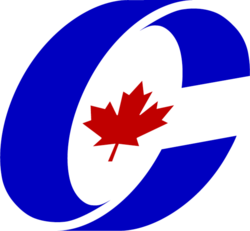Conservative Party Of Canada
 From Conservapedia
From Conservapedia | Conservative Party of Canada | |
|---|---|

| |
| Party leader | Pierre Poilievre |
| Parliamentary leader | |
| Founded | December 7, 2003 |
| Headquarters | Ottawa |
| Political ideology | Conservatism |
| Political position | Center-right to right-wing |
| International affiliation | International Democrat Union Alliance of Conservatives and Reformists in Europe (regional partner) |
| Color(s) | Blue |
| Website | https://www.conservative.ca/ |
The Conservative Party of Canada, or Parti conservateur du Canada, and colloquially known as the Tories, is a Canadian federal political party, formed after the 2003 amalgamation of the national Progressive Conservative Party of Canada and the Canadian Alliance. The party united right-of-center and right-wing Canadians under one common banner and won a minority government in 2006, ending a 13-year reign by the Liberal Party of Canada. Its party leader until 2015, and Prime Minister of Canada until then, was the Right Honourable Stephen Harper. The party held a majority government with 166 out of 308 seats. There are also provincial versions of the Conservative party, of varying dominance, in almost every province, with the exception of Quebec. The party is currently led by Ontario Member of Parliament Pierre Poilievre, who won the Conservative leadership convention on September 10, 2022; prior to this, Manitoba Member of Parliament Candice Bergen had taken over as interim leader on February 2, 2022 following the removal of ineffectual previous leader Erin O'Toole.
Its success proved to be short-lived. Under previous leaders such as O'Toole and Andrew Scheer, this party largely abandoned socially conservative issues and pursued the dead-end of fiscal reform alone. In 2015 this game-plan resulted in a landslide defeat.
It is a regional partner of the Alliance of Conservatives and Reformists in Europe.
History[edit]
After the 1993 defeat of the Canada's only female Prime Minister, Kim Campbell, the Progressive Conservatives, a center-right party, were reduced to just two seats in the House of Commons. Another right-wing party, the Reform Party, gained 52 seats in that election. In 2000, the Reform Party changed its name to the Canadian Alliance. After a decade of split votes between the Progressive Conservatives and the Canadian Alliance, the parties merged.
Policies[edit]
The party is generally supportive of privatization, a smaller federal government, larger provincial governments, closer relations with the United States, Senate reform, implementation of a two-tier health care system, and a stronger military. The party opposes legalization of cannabis, and held a free-vote on reopening the issue of same-sex "marriage" (which was ultimately defeated). They have also motioned for fixed election dates, raising both supporters and detractors among all Canadian political parties, removal of the per-vote subsidy, and for government accountability.
In 2016, the party voted at its National Policy Convention to remove opposition to same-sex "marriage" from its platform.
The party takes several inconsistent positions – for example, it has dropped candidates simply for sharing links from conservative media sources such as LifeSiteNews.[1] Additionally, the party has become increasingly left-wing on abortion,[2][3] and it attacked a more conservative party during the election, reportedly even hiring a pro-Antifa consultant.[4] The party's liberal posturing leading up to the 2019 election alienated conservatives, and the party lost the elections, to its disappointment.[5] although it was able to take seats and the popular vote from the Liberals and reduce that party to minority government status. The party joined with the media to smear pro-life advocates by blaming them for the election loss.[6]
Controversies[edit]
The Conservative Party has gone through many controversies in its history. Often derided by center, and leftist Canadians as too far on the right, for its stances on criminal law and taxation, the Conservative Party is seen as a puppet of the American government. To observers from the United States, the Conservative Party is often seen as a misnomer, a wildly liberal political entity masquerading as a conservative organization, citing the party's stance on same-sex "marriage" and abortion. Recently, however, the controversies are around the F-35 scandal, criticized as too expensive, vastly overdue, and inferior to Canadian made aircraft. Another scandal that rocked the party was the Robocall Scandal, where it is alleged that certain MPs were deceitfully misleading voters on voting locations. Additionally, the party under then-leader Andrew Scheer had David Menzies, a reporter for conservative news outlet Rebel News, unjustly arrested at an event.[7][8]
See also[edit]
References[edit]
- ↑ Van Maren, Jonathon (May 15, 2019). Weak ‘conservative’ party drops candidate for sharing pro-life, pro-family LifeSite articles. LifeSiteNews. Retrieved May 15, 2019.
- ↑ Ljunggren, David (August 29, 2019). Main Canada opposition leader says he will not reopen abortion debate, Trudeau skeptical. Reuters. Retrieved August 29, 2019.
- ↑ Larence, Lianne (August 29, 2019). Canadian Conservative leader: I will ‘oppose measures’ to reopen abortion debate. LifeSiteNews. Retrieved August 29, 2019.
- ↑ Tomlinson, Chris (November 27, 2019). Canada’s ‘Conservatives’ Allegedly Hired Pro-Antifa Consultant To Smear Populist Party. Breitbart News. Retrieved November 27, 2019.
- ↑ Laurence, Lianne (October 22, 2019). Canada reelects pro-abortion Liberal Trudeau after Conservative leader alienates base. LifeSiteNews. Retrieved October 22, 2019.
See also:- Fonseca, Jack (October 28, 2019). Canada election analysis: Trudeau at his weakest destroyed compromised Scheer. LifeSiteNews (from the Campaign Life Coalition). Retrieved October 28, 2019.
- ↑ Murdoch, Anthony (November 27, 2019). Pro-abortion Conservatives collude with Canada’s media to silence pro-life voters. LifeSiteNews. Retrieved November 27, 2019.
- ↑ https://www.rebelnews.com/shock_video_cops_eject_rebel_news_david_menzies_from_andrew_scheer_event_let_us_report
- ↑ https://www.thepostmillennial.com/banana-republic-behaviour-rebel-reporter-on-his-ejection-arrest-at-conservative-campaign-event/
External links[edit]
Categories: [Canadian Political Parties] [Conservative Political Parties] [Member of the International Democrat Union]
↧ Download as ZWI file | Last modified: 03/12/2023 03:59:43 | 36 views
☰ Source: https://www.conservapedia.com/Conservative_Party_of_Canada | License: CC BY-SA 3.0
 ZWI signed:
ZWI signed: KSF
KSF